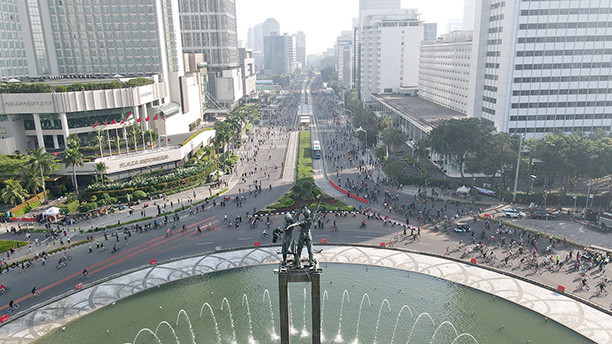Popular Reads
Top Results
Can't find what you're looking for?
View all search resultsPopular Reads
Top Results
Can't find what you're looking for?
View all search resultsJakarta’s partial lockdown plan requires caution, calculation: Jokowi
"We need to calculate how pulling the emergency brake will affect people's activities and other [concerns]. Jakarta is, after all, the country's capital," Jokowi said at Bogor Palace in West Java.
Change text size
Gift Premium Articles
to Anyone
P
resident Joko "Jokowi" Widodo has called on the Jakarta administration to thoroughly assess its plan to reimpose a partial COVID-19 lockdown on the city as the nation struggles to balance the demands of public health and the economy.
Jokowi said during a meeting with media figures on Thursday that the decision to enforce large-scale social restrictions (PSBB) – which would limit public mobility and the operation of businesses – should be "well and cautiously calculated".
"We need to calculate how pulling the emergency brake will affect people's activities and other [concerns]. Jakarta is, after all, the country's capital," Jokowi said at Bogor Palace in West Java.
Jakarta Governor Anies Baswedan announced on Wednesday that the capital would "pull the emergency brake" on its transitional "new normal" period and reinstate full PSBB on Monday as the persistent rise of COVID-19 cases in the capital strained the city’s healthcare system.
With the return of PSBB, Jakarta is set to once again restrict access to public facilities and events and limit the operational hours and capacity of public transportation. The city will likely allow only 11 essential sectors to operate – under limited capacity – while other industries will likely be required to have employees work from home.
The governor said low-income families and vulnerable residents would receive social aid.
Some of Jokowi's ministers, however, have expressed concerns about reimposing PSBB in Jakarta, Indonesia's economic powerhouse, citing possible impediments to the country's economic recovery.
Read also: Jakarta lockdown aimed at preventing collapse of healthcare system
Trade Minister Agus Suparmanto warned about the risk of logistical disruptions if PSBB was reimposed. He feared the country's gross domestic product (GDP) would be affected if goods and services were not distributed properly.
As Anies prepares a gubernatorial decree to outline Jakarta’s PSBB measures, health experts have urged other regions, especially those whose healthcare systems are overwhelmed, to follow the capital’s example and enforce stricter restrictions.
Jokowi said Jakarta should discuss the implementation of PSBB with its satellite cities, which collectively form the urban area known as Greater Jakarta.
The President suggested that social restrictions should only be implemented in “red zones”, proposing that areas be assessed on a case-by-case basis.
“Why should we close [everything] if one part is red but a thousand parts are green? I think we should be able to implement micro-scale social restrictions. We would enforce strict restrictions in the red areas with the help of neighborhood officials," he said.
As of Friday, the leaders of Jakarta's satellite cities – to and from which hundreds of thousands of people commute daily – had not decided whether to enforce stricter COVID-19 restrictions, despite high transmission rates.
“We have no plans to impose stricter PSBB yet. We’re still following the Banten gubernatorial regulation on Greater Tangerang PSBB,” South Tangerang Mayor Airin Rachmi Diany said.
Read also: Govt should prioritize health response over economic recovery: Task force
“Governor [Anies] said he needed to work out more detailed and clearer measures for the PSBB policy with the central government, so we’ll wait for that,” Bogor Mayor Bima Arya Sugianto said.
Jokowi acknowledged that balancing the economy and public health had not been an easy task. He recently reminded his aides to prioritize COVID-19 mitigation efforts, saying that public health was the key to economic recovery.
The President claimed Indonesia had made significant progress on its journey to overcome the outbreak.
“For example, the recovery rate was very low in March, only 8 percent, but we improved in April, May and June. Previously, the mortality rate was 8 to 9 percent, but it went lower – to around 4.1 percent in August,” he said.
Indonesia has seen its infection rate soar to new highs over the past few weeks.
Authorities confirmed 3,861 new COVID-19 infections on Thursday – a record increase – followed by 3,737 new cases on Friday. Nationwide, the country has recorded 210,940 cases, including 150,217 recoveries and 8,544 fatalities.
Jakarta accounts for about a quarter of the total cases, with 51,635 confirmed cases as of Friday, including 39,128 recoveries and 1,368 deaths.










